Care Setting Information Handling: Legislation, Codes, and Security
VerifiedAdded on 2023/01/12
|5
|1287
|68
Homework Assignment
AI Summary
This assignment addresses the critical aspects of handling information within care settings, focusing on legislation, codes of practice, and security measures. It begins by identifying key legislations like the Health and Social Care Act 2012 and the Data Protection Act, alongside relevant codes of practice emphasizing fair, lawful, and limited data processing. The assignment summarizes legal requirements, highlighting the importance of confidentiality, protecting service users, and ensuring data accuracy and security. It then details features of both manual and electronic information storage systems, emphasizing the use of passwords, secure storage, and the need-to-know principle for data sharing. The paper underscores the significance of these practices in maintaining patient privacy and promoting effective healthcare delivery. References from relevant journals and books are included to support the findings.
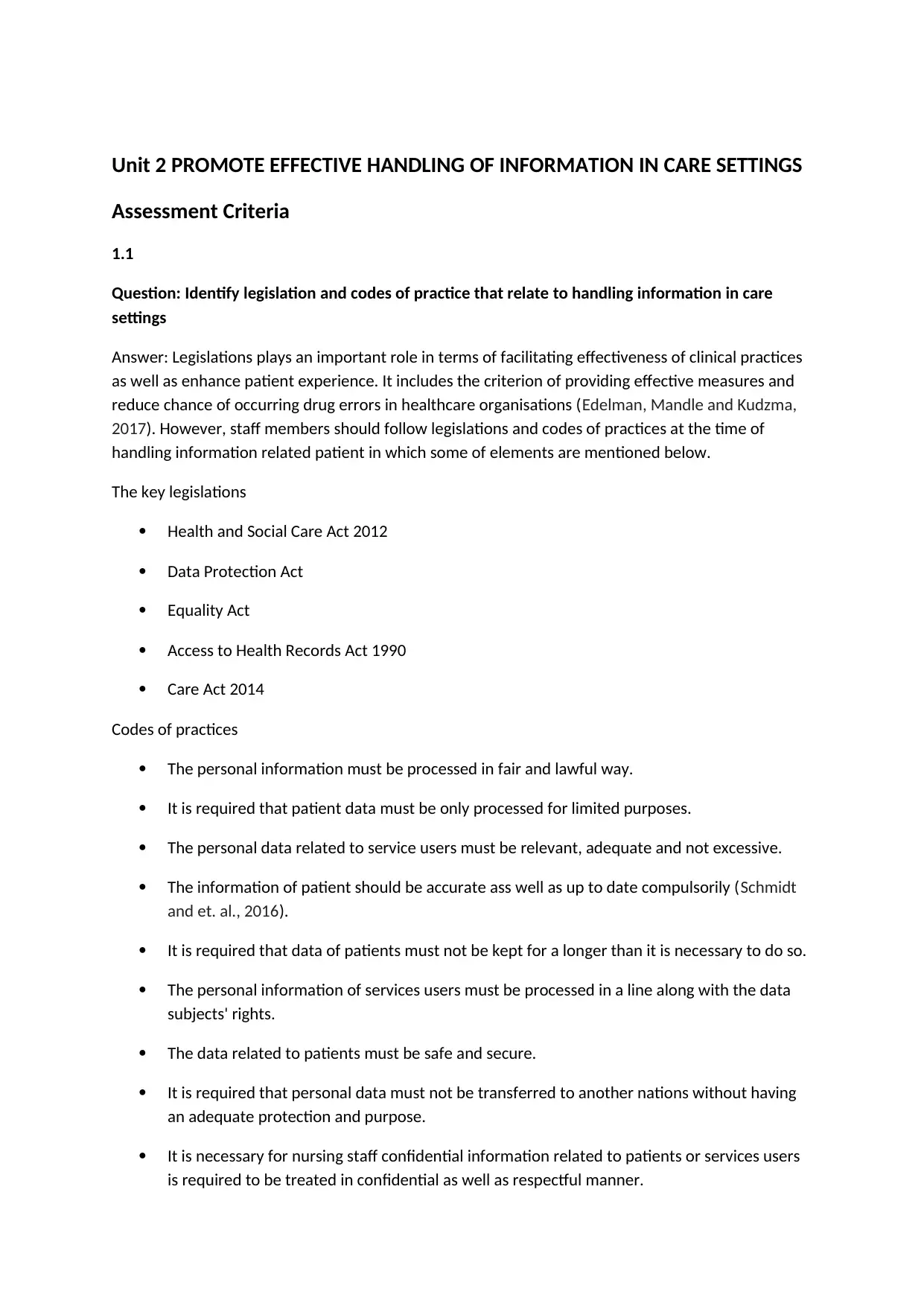
Unit 2 PROMOTE EFFECTIVE HANDLING OF INFORMATION IN CARE SETTINGS
Assessment Criteria
1.1
Question: Identify legislation and codes of practice that relate to handling information in care
settings
Answer: Legislations plays an important role in terms of facilitating effectiveness of clinical practices
as well as enhance patient experience. It includes the criterion of providing effective measures and
reduce chance of occurring drug errors in healthcare organisations (Edelman, Mandle and Kudzma,
2017). However, staff members should follow legislations and codes of practices at the time of
handling information related patient in which some of elements are mentioned below.
The key legislations
Health and Social Care Act 2012
Data Protection Act
Equality Act
Access to Health Records Act 1990
Care Act 2014
Codes of practices
The personal information must be processed in fair and lawful way.
It is required that patient data must be only processed for limited purposes.
The personal data related to service users must be relevant, adequate and not excessive.
The information of patient should be accurate ass well as up to date compulsorily (Schmidt
and et. al., 2016).
It is required that data of patients must not be kept for a longer than it is necessary to do so.
The personal information of services users must be processed in a line along with the data
subjects' rights.
The data related to patients must be safe and secure.
It is required that personal data must not be transferred to another nations without having
an adequate protection and purpose.
It is necessary for nursing staff confidential information related to patients or services users
is required to be treated in confidential as well as respectful manner.
Assessment Criteria
1.1
Question: Identify legislation and codes of practice that relate to handling information in care
settings
Answer: Legislations plays an important role in terms of facilitating effectiveness of clinical practices
as well as enhance patient experience. It includes the criterion of providing effective measures and
reduce chance of occurring drug errors in healthcare organisations (Edelman, Mandle and Kudzma,
2017). However, staff members should follow legislations and codes of practices at the time of
handling information related patient in which some of elements are mentioned below.
The key legislations
Health and Social Care Act 2012
Data Protection Act
Equality Act
Access to Health Records Act 1990
Care Act 2014
Codes of practices
The personal information must be processed in fair and lawful way.
It is required that patient data must be only processed for limited purposes.
The personal data related to service users must be relevant, adequate and not excessive.
The information of patient should be accurate ass well as up to date compulsorily (Schmidt
and et. al., 2016).
It is required that data of patients must not be kept for a longer than it is necessary to do so.
The personal information of services users must be processed in a line along with the data
subjects' rights.
The data related to patients must be safe and secure.
It is required that personal data must not be transferred to another nations without having
an adequate protection and purpose.
It is necessary for nursing staff confidential information related to patients or services users
is required to be treated in confidential as well as respectful manner.
Paraphrase This Document
Need a fresh take? Get an instant paraphrase of this document with our AI Paraphraser
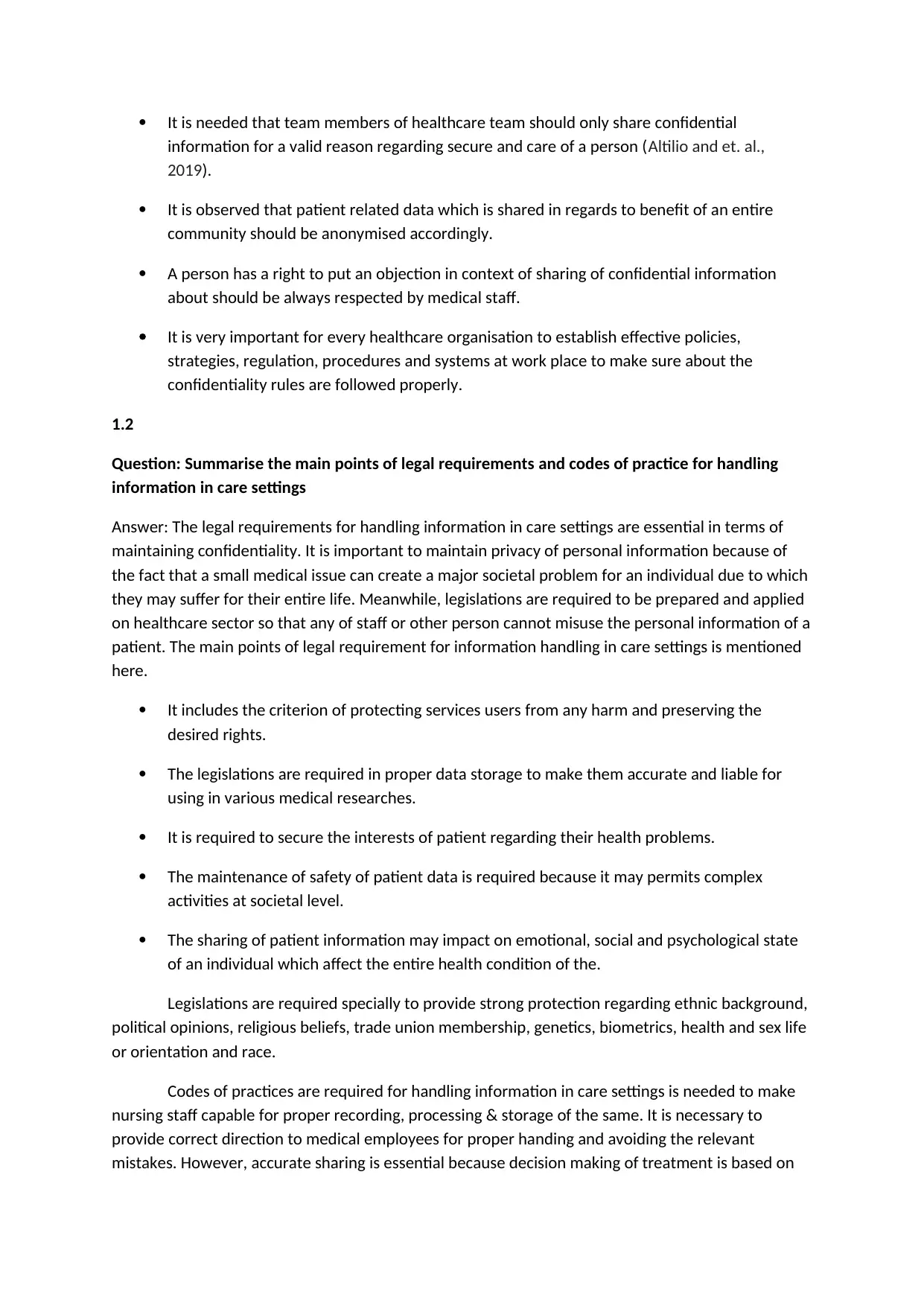
It is needed that team members of healthcare team should only share confidential
information for a valid reason regarding secure and care of a person (Altilio and et. al.,
2019).
It is observed that patient related data which is shared in regards to benefit of an entire
community should be anonymised accordingly.
A person has a right to put an objection in context of sharing of confidential information
about should be always respected by medical staff.
It is very important for every healthcare organisation to establish effective policies,
strategies, regulation, procedures and systems at work place to make sure about the
confidentiality rules are followed properly.
1.2
Question: Summarise the main points of legal requirements and codes of practice for handling
information in care settings
Answer: The legal requirements for handling information in care settings are essential in terms of
maintaining confidentiality. It is important to maintain privacy of personal information because of
the fact that a small medical issue can create a major societal problem for an individual due to which
they may suffer for their entire life. Meanwhile, legislations are required to be prepared and applied
on healthcare sector so that any of staff or other person cannot misuse the personal information of a
patient. The main points of legal requirement for information handling in care settings is mentioned
here.
It includes the criterion of protecting services users from any harm and preserving the
desired rights.
The legislations are required in proper data storage to make them accurate and liable for
using in various medical researches.
It is required to secure the interests of patient regarding their health problems.
The maintenance of safety of patient data is required because it may permits complex
activities at societal level.
The sharing of patient information may impact on emotional, social and psychological state
of an individual which affect the entire health condition of the.
Legislations are required specially to provide strong protection regarding ethnic background,
political opinions, religious beliefs, trade union membership, genetics, biometrics, health and sex life
or orientation and race.
Codes of practices are required for handling information in care settings is needed to make
nursing staff capable for proper recording, processing & storage of the same. It is necessary to
provide correct direction to medical employees for proper handing and avoiding the relevant
mistakes. However, accurate sharing is essential because decision making of treatment is based on
information for a valid reason regarding secure and care of a person (Altilio and et. al.,
2019).
It is observed that patient related data which is shared in regards to benefit of an entire
community should be anonymised accordingly.
A person has a right to put an objection in context of sharing of confidential information
about should be always respected by medical staff.
It is very important for every healthcare organisation to establish effective policies,
strategies, regulation, procedures and systems at work place to make sure about the
confidentiality rules are followed properly.
1.2
Question: Summarise the main points of legal requirements and codes of practice for handling
information in care settings
Answer: The legal requirements for handling information in care settings are essential in terms of
maintaining confidentiality. It is important to maintain privacy of personal information because of
the fact that a small medical issue can create a major societal problem for an individual due to which
they may suffer for their entire life. Meanwhile, legislations are required to be prepared and applied
on healthcare sector so that any of staff or other person cannot misuse the personal information of a
patient. The main points of legal requirement for information handling in care settings is mentioned
here.
It includes the criterion of protecting services users from any harm and preserving the
desired rights.
The legislations are required in proper data storage to make them accurate and liable for
using in various medical researches.
It is required to secure the interests of patient regarding their health problems.
The maintenance of safety of patient data is required because it may permits complex
activities at societal level.
The sharing of patient information may impact on emotional, social and psychological state
of an individual which affect the entire health condition of the.
Legislations are required specially to provide strong protection regarding ethnic background,
political opinions, religious beliefs, trade union membership, genetics, biometrics, health and sex life
or orientation and race.
Codes of practices are required for handling information in care settings is needed to make
nursing staff capable for proper recording, processing & storage of the same. It is necessary to
provide correct direction to medical employees for proper handing and avoiding the relevant
mistakes. However, accurate sharing is essential because decision making of treatment is based on
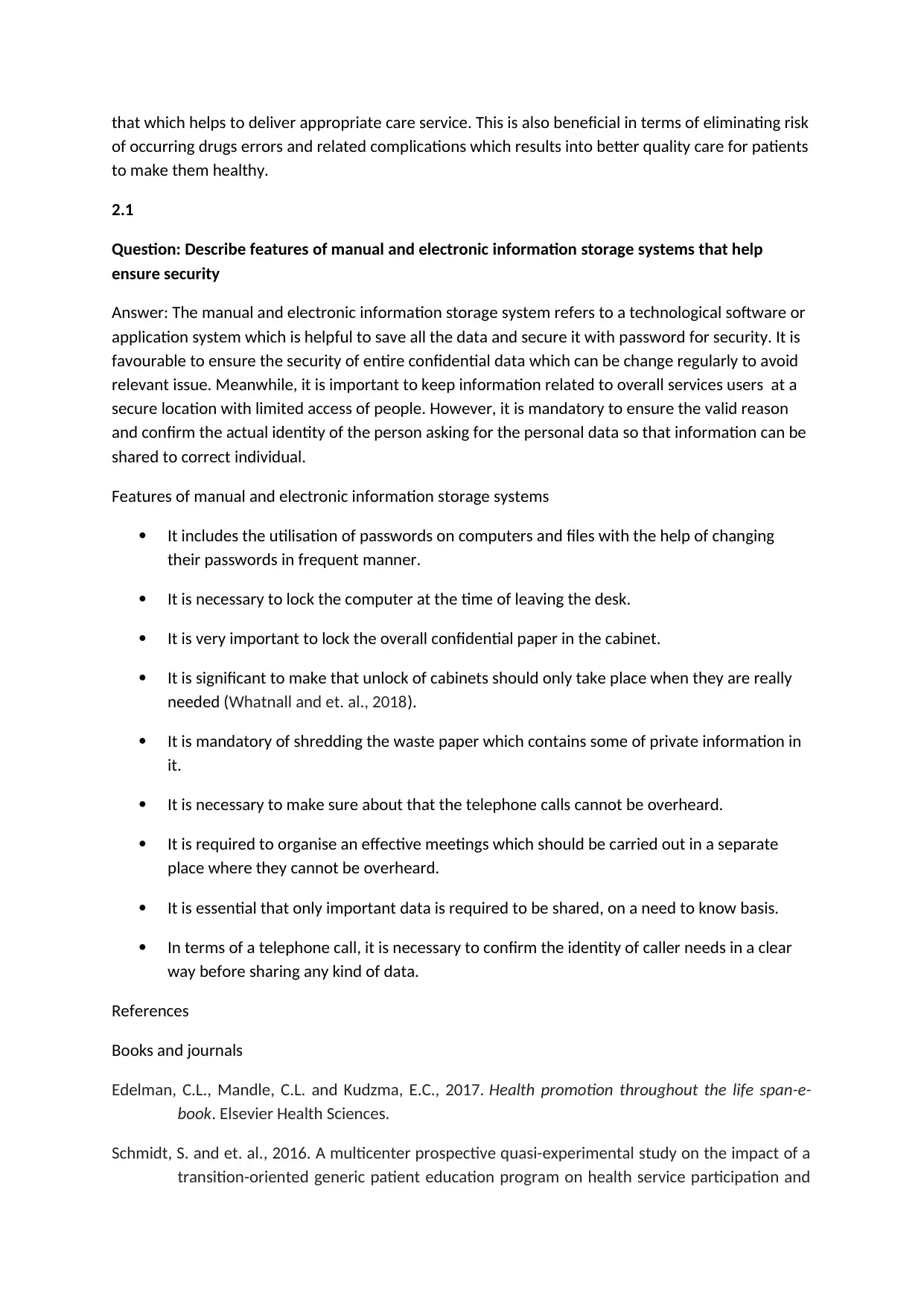
that which helps to deliver appropriate care service. This is also beneficial in terms of eliminating risk
of occurring drugs errors and related complications which results into better quality care for patients
to make them healthy.
2.1
Question: Describe features of manual and electronic information storage systems that help
ensure security
Answer: The manual and electronic information storage system refers to a technological software or
application system which is helpful to save all the data and secure it with password for security. It is
favourable to ensure the security of entire confidential data which can be change regularly to avoid
relevant issue. Meanwhile, it is important to keep information related to overall services users at a
secure location with limited access of people. However, it is mandatory to ensure the valid reason
and confirm the actual identity of the person asking for the personal data so that information can be
shared to correct individual.
Features of manual and electronic information storage systems
It includes the utilisation of passwords on computers and files with the help of changing
their passwords in frequent manner.
It is necessary to lock the computer at the time of leaving the desk.
It is very important to lock the overall confidential paper in the cabinet.
It is significant to make that unlock of cabinets should only take place when they are really
needed (Whatnall and et. al., 2018).
It is mandatory of shredding the waste paper which contains some of private information in
it.
It is necessary to make sure about that the telephone calls cannot be overheard.
It is required to organise an effective meetings which should be carried out in a separate
place where they cannot be overheard.
It is essential that only important data is required to be shared, on a need to know basis.
In terms of a telephone call, it is necessary to confirm the identity of caller needs in a clear
way before sharing any kind of data.
References
Books and journals
Edelman, C.L., Mandle, C.L. and Kudzma, E.C., 2017. Health promotion throughout the life span-e-
book. Elsevier Health Sciences.
Schmidt, S. and et. al., 2016. A multicenter prospective quasi-experimental study on the impact of a
transition-oriented generic patient education program on health service participation and
of occurring drugs errors and related complications which results into better quality care for patients
to make them healthy.
2.1
Question: Describe features of manual and electronic information storage systems that help
ensure security
Answer: The manual and electronic information storage system refers to a technological software or
application system which is helpful to save all the data and secure it with password for security. It is
favourable to ensure the security of entire confidential data which can be change regularly to avoid
relevant issue. Meanwhile, it is important to keep information related to overall services users at a
secure location with limited access of people. However, it is mandatory to ensure the valid reason
and confirm the actual identity of the person asking for the personal data so that information can be
shared to correct individual.
Features of manual and electronic information storage systems
It includes the utilisation of passwords on computers and files with the help of changing
their passwords in frequent manner.
It is necessary to lock the computer at the time of leaving the desk.
It is very important to lock the overall confidential paper in the cabinet.
It is significant to make that unlock of cabinets should only take place when they are really
needed (Whatnall and et. al., 2018).
It is mandatory of shredding the waste paper which contains some of private information in
it.
It is necessary to make sure about that the telephone calls cannot be overheard.
It is required to organise an effective meetings which should be carried out in a separate
place where they cannot be overheard.
It is essential that only important data is required to be shared, on a need to know basis.
In terms of a telephone call, it is necessary to confirm the identity of caller needs in a clear
way before sharing any kind of data.
References
Books and journals
Edelman, C.L., Mandle, C.L. and Kudzma, E.C., 2017. Health promotion throughout the life span-e-
book. Elsevier Health Sciences.
Schmidt, S. and et. al., 2016. A multicenter prospective quasi-experimental study on the impact of a
transition-oriented generic patient education program on health service participation and
⊘ This is a preview!⊘
Do you want full access?
Subscribe today to unlock all pages.

Trusted by 1+ million students worldwide
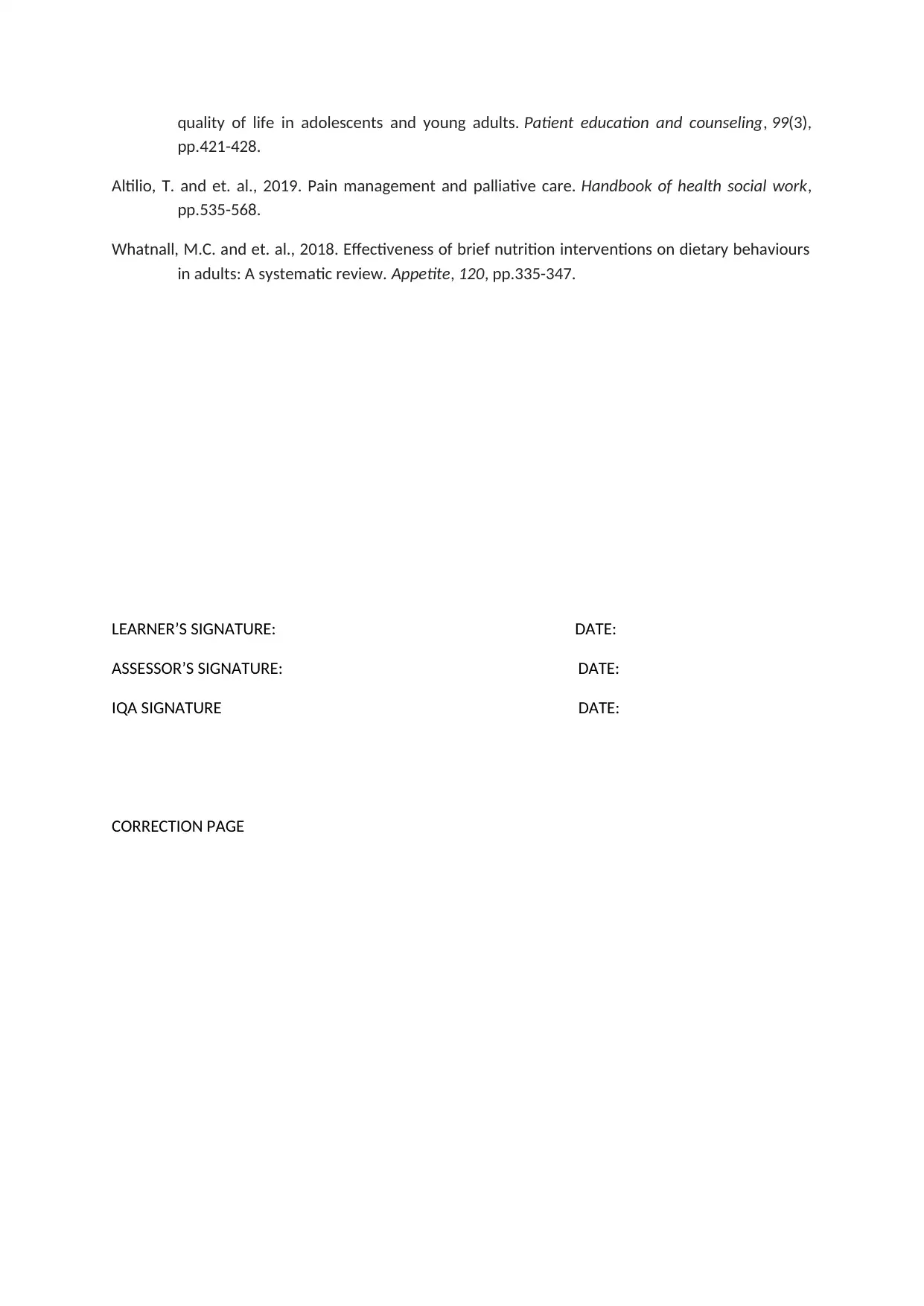
quality of life in adolescents and young adults. Patient education and counseling, 99(3),
pp.421-428.
Altilio, T. and et. al., 2019. Pain management and palliative care. Handbook of health social work,
pp.535-568.
Whatnall, M.C. and et. al., 2018. Effectiveness of brief nutrition interventions on dietary behaviours
in adults: A systematic review. Appetite, 120, pp.335-347.
LEARNER’S SIGNATURE: DATE:
ASSESSOR’S SIGNATURE: DATE:
IQA SIGNATURE DATE:
CORRECTION PAGE
pp.421-428.
Altilio, T. and et. al., 2019. Pain management and palliative care. Handbook of health social work,
pp.535-568.
Whatnall, M.C. and et. al., 2018. Effectiveness of brief nutrition interventions on dietary behaviours
in adults: A systematic review. Appetite, 120, pp.335-347.
LEARNER’S SIGNATURE: DATE:
ASSESSOR’S SIGNATURE: DATE:
IQA SIGNATURE DATE:
CORRECTION PAGE
Paraphrase This Document
Need a fresh take? Get an instant paraphrase of this document with our AI Paraphraser
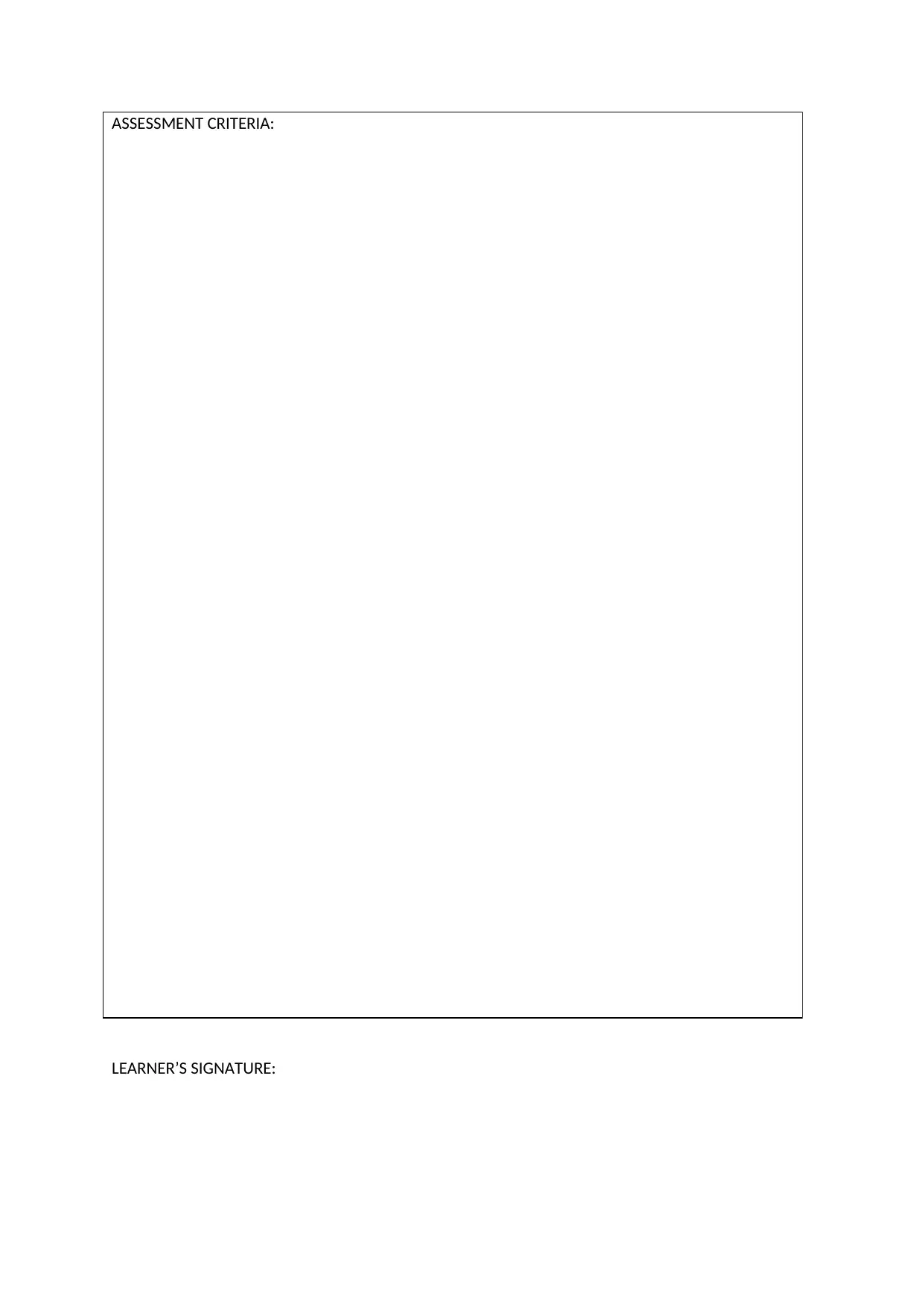
ASSESSMENT CRITERIA:
LEARNER’S SIGNATURE:
LEARNER’S SIGNATURE:
1 out of 5
Related Documents
Your All-in-One AI-Powered Toolkit for Academic Success.
+13062052269
info@desklib.com
Available 24*7 on WhatsApp / Email
![[object Object]](/_next/static/media/star-bottom.7253800d.svg)
Unlock your academic potential
Copyright © 2020–2026 A2Z Services. All Rights Reserved. Developed and managed by ZUCOL.





